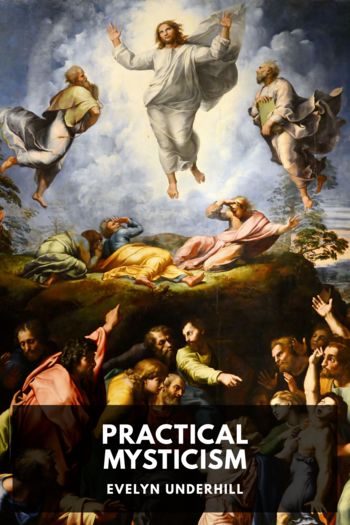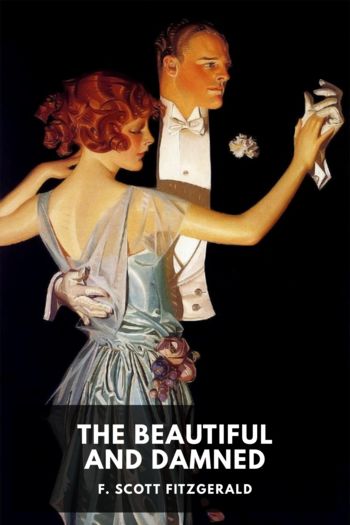Practical Mysticism by Evelyn Underhill (classic reads .txt) 📕

- Author: Evelyn Underhill
Book online «Practical Mysticism by Evelyn Underhill (classic reads .txt) 📕». Author Evelyn Underhill
But this growth into higher realities, this blossoming of your contemplative consciousness—though it be, like all else we know in life, an unbroken process of movement and change—must be broken up and reduced to the series of concrete forms which we call “order” if our inelastic minds are to grasp it. So, we will consider it as the successive achievement of those three levels or manifestations of Reality, which we have agreed to call the Natural World of Becoming, the Metaphysical World of Being, and—last and highest—that Divine Reality within which these opposites are found as one. Though these three worlds of experience are so plaited together, that intimations from the deeper layers of being constantly reach you through the natural scene, it is in this order of realisation that you may best think of them, and of your own gradual upgrowth to the full stature of humanity. To elude nature, to refuse her friendship, and attempt to leap the river of life in the hope of finding God on the other side, is the common error of a perverted mysticality. It is as fatal in result as the opposite error of deliberately arrested development, which, being attuned to the wonderful rhythms of natural life, is content with this increase of sensibility; and, becoming a “nature-mystic,” asks no more.
So you are to begin with that first form of contemplation which the old mystics sometimes called the “discovery of God in His creatures.” Not with some ecstatic adventure in supersensuous regions, but with the loving and patient exploration of the world that lies at your gates; the “ebb and flow and ever-during power” of which your own existence forms a part. You are to push back the self’s barriers bit by bit, till at last all duration is included in the widening circles of its intuitive love: till you find in every manifestation of life—even those which you have petulantly classified as cruel or obscene—the ardent self-expression of that Immanent Being whose spark burns deep in your own soul.
The Indian mystics speak perpetually of the visible universe as the Līlā or Sport of God: the Infinite deliberately expressing Himself in finite form, the musical manifestation of His creative joy. All gracious and all courteous souls, they think, will gladly join His play; considering rather the wonder and achievement of the whole—its vivid movement, its strange and terrible evocations of beauty from torment, nobility from conflict and death, its mingled splendour of sacrifice and triumph—than their personal conquests, disappointments, and fatigues. In the first form of contemplation you are to realise the movement of this game, in which you have played so long a languid and involuntary part, and find your own place in it. It is flowing, growing, changing, making perpetual unexpected patterns within the evolving melody of the Divine Thought. In all things it is incomplete, unstable; and so are you. Your fellow-men, enduring on the battlefield, living and breeding in the slum, adventurous and studious, sensuous and pure—more, your great comrades, the hills, the trees, the rivers, the darting birds, the scuttering insects, the little soft populations of the grass—all these are playing with you. They move one to another in delicate responsive measures, now violent, now gentle, now in conflict, now in peace; yet ever weaving the pattern of a ritual dance, and obedient to the music of that invisible Choragus whom Boehme and Plotinus knew. What is that great wind which blows without, in continuous and ineffable harmonies? Part of you, practical man. There is but one music in the world: and to it you contribute perpetually, whether you will or no, your one little ditty of no tone.
“Mad with joy, life and death dance to the rhythm of this music:
The hills and the sea and the Earth dance:
The world of man dances in laughter and tears.”
It seems a pity to remain in ignorance of this, to keep as it were a plate-glass window between yourself and your fellow-dancers—all those other thoughts of God, perpetually becoming, changing and growing beside you—and commit yourself to the unsocial attitude of the “cat that walks by itself.”
Begin therefore at once. Gather yourself up, as the exercises of recollection have taught you to do. Then—with attention no longer frittered amongst the petty accidents and interests of your personal life, but poised, tense, ready for the work you shall demand of it—stretch out by a distinct act of loving will towards one of the myriad manifestations of life that surround you: and which, in an ordinary way, you hardly notice unless you happen to need them. Pour yourself out towards it, do not draw its image towards you. Deliberate—more, impassioned—attentiveness, an attentiveness which soon transcends all consciousness of yourself, as separate from and attending to the thing seen; this is the condition of success. As to the object of contemplation, it matters little. From Alp to insect, anything will do, provided that your attitude be right: for all things in this world towards which you are stretching out are linked together, and one truly apprehended will be the gateway to the rest.
Look with the eye of contemplation on the most dissipated tabby of the streets, and you shall discern the celestial quality of life set like an aureole about his tattered ears, and hear in his strident mew an echo of
“The deep enthusiastic joy,
The rapture of the hallelujah sent
From all that breathes and is.”
The sooty tree up which he scrambles to escape your earnest gaze is holy too. It contains for you the whole divine cycle of the seasons; upon the plane of quiet, its inward pulse is clearly to be heard. But you must look at these things as you would look into the eyes of a friend: ardently, selflessly, without considering his reputation, his practical uses, his anatomical peculiarities, or the vices which might emerge were he subjected to psychoanalysis.
Such a simple exercise, if entered upon with





Comments (0)